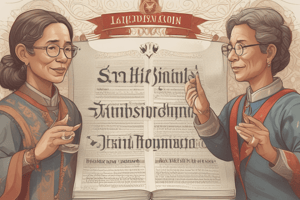Podcast
Questions and Answers
What is the purpose of the duties and obligations of citizens in a democracy?
What is the purpose of the duties and obligations of citizens in a democracy?
- To abuse their rights and freedoms
- To undermine the Constitution
- To overthrow the government
- To contribute to the development and welfare of the State (correct)
How can one become a good citizen?
How can one become a good citizen?
- By only exercising their rights and freedoms
- By being apathetic to the government and society
- By living in accordance with good citizenship values derived from the Constitution (correct)
- By disobeying the laws and authorities
What is NOT a duty and obligation of citizens in a democracy?
What is NOT a duty and obligation of citizens in a democracy?
- To defend the state
- To engage in violent protests (correct)
- To contribute to the development and welfare of the State
- To uphold the Constitution and obey the laws
Which of the following is a type of naturalization?
Which of the following is a type of naturalization?
What is the importance of citizens registering and voting?
What is the importance of citizens registering and voting?
What is the relation between citizens' duties and the Constitution?
What is the relation between citizens' duties and the Constitution?
What is the definition of Constitution?
What is the definition of Constitution?
What is the difference between citizenship and nationality?
What is the difference between citizenship and nationality?
How can one acquire citizenship in the Philippines?
How can one acquire citizenship in the Philippines?
What is Jus Soli?
What is Jus Soli?
Who are considered citizens of the Philippines according to the 1987 Philippine Constitution?
Who are considered citizens of the Philippines according to the 1987 Philippine Constitution?
What is the significance of Article IV of the 1987 Philippine Constitution?
What is the significance of Article IV of the 1987 Philippine Constitution?
What is naturalization?
What is naturalization?
What is the importance of understanding the concept of citizenship?
What is the importance of understanding the concept of citizenship?
Who composed the music of the Philippine national anthem in 1898?
Who composed the music of the Philippine national anthem in 1898?
What is the title of the Spanish poem that the lyrics of the Philippine national anthem were adapted from?
What is the title of the Spanish poem that the lyrics of the Philippine national anthem were adapted from?
What is the primary goal of the Government established by the 1987 Philippine Constitution?
What is the primary goal of the Government established by the 1987 Philippine Constitution?
What is the title of the book written by Sonia G. Dela Cruz in 2005?
What is the title of the book written by Sonia G. Dela Cruz in 2005?
Who translated the Spanish poem 'Marcha Nacional' into Filipino?
Who translated the Spanish poem 'Marcha Nacional' into Filipino?
When was the Philippine national anthem's music composed?
When was the Philippine national anthem's music composed?
Flashcards are hidden until you start studying
Study Notes
Citizenship
• Citizenship refers to the legal relationship between a person and a country. • It defines the rights and obligations of a person towards their country.
Philippine Constitution
• The Constitution of the Philippines is a written instrument that establishes, limits, and defines the fundamental powers of the government. • It distributes these powers among several departments or branches for the safe and useful exercise of the government for the benefit of the people.
Citizenship vs. Nationality
• Citizenship refers to the legal relationship between a person and a country. • Nationality refers to the country of origin or the country a person belongs to.
Modes of Acquiring Citizenship in the Philippines
• By Birth: A person acquires citizenship through Jus Soli (law of the soil) or Jus Sanguinis (law of the blood). • By Naturalization: A person can acquire citizenship through direct or derivative naturalization.
Direct Naturalization
• Administrative Naturalization (Ra 9139) • Judicial Naturalization • Legislative Naturalization
Derivative Naturalization
• No specific details provided
Who are Citizens of the Philippines?
• Those who are citizens of the Philippines at the time of the adoption of the Constitution. • Those whose fathers or mothers are citizens of the Philippines. • Those born before January 17, 1973, of Filipino mothers, who elect Philippine citizenship upon reaching the age of majority. • Those who are naturalized in accordance with the law.
Duties and Obligations of Citizens
• To be loyal to the republic • To defend the state • To contribute to the development and welfare of the state • To uphold the Constitution and obey the laws • To cooperate with duly constituted authorities • To exercise rights responsibly and with due regard for the rights of others • To engage in gainful work • To register and vote
Good Citizenship
• Can be achieved by living in accordance with good citizenship values • Values derived from the preamble of the Constitution include: + Faith in God + Unity + Patriotism + Equality + Peace + Promotion of a common good + Concern for the family and future generations + Concern for the environment and order
Philippine National Anthem
• The music was composed in 1898 by Julian Felipe • The lyrics were adapted from the Spanish poem "Marcha Nacional" and translated into Filipino as "Filipinas" by Jose Palma
Studying That Suits You
Use AI to generate personalized quizzes and flashcards to suit your learning preferences.




